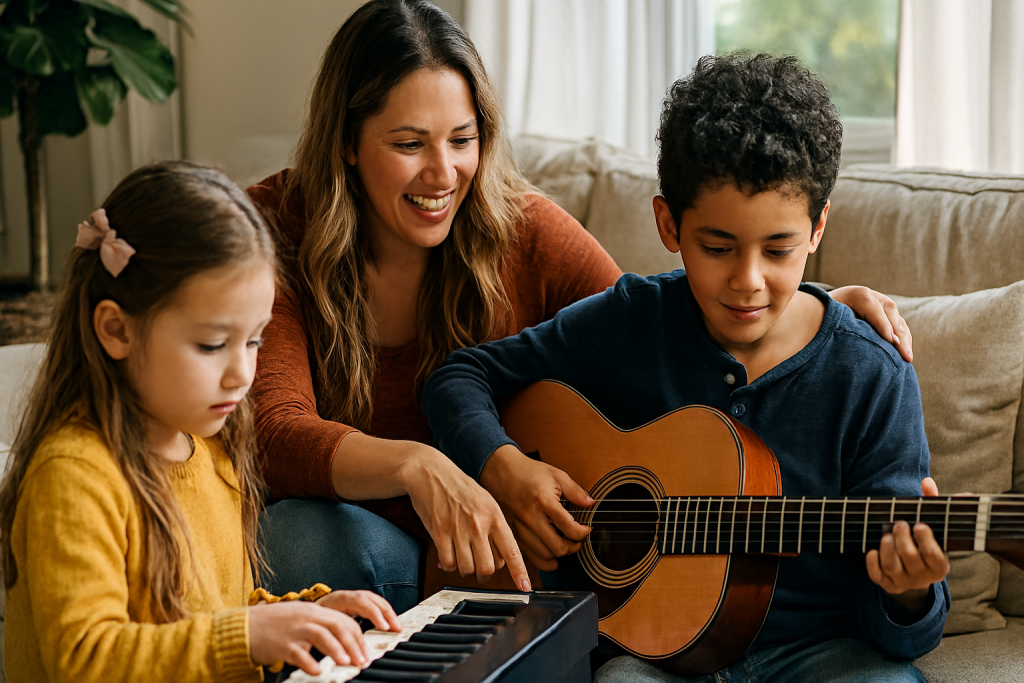Do you want to teach your child music but don’t know where to start? Look no further! In this article, we’ll guide you through the process of teaching your child music in an engaging and structured way. From creating a musical environment at home to developing listening skills and nurturing a love for playing an instrument, we’ve got you covered. So, grab your instruments and get ready to embark on a musical journey with your little one!
The Importance of Music Education
One of the most important aspects of teaching music to a child is understanding the significant impact that music education can have on their overall development. Music education offers a wide range of benefits that go beyond just learning how to play an instrument or sing. Research has shown that engaging in music can have a profound impact on a child’s cognitive development.
Firstly, music education enhances the brain’s ability to process and retain information. Learning to read sheet music, memorizing lyrics, and understanding rhythm and timing all require the brain to make connections and recall information. This strengthens neural pathways and improves memory and concentration skills.
Moreover, music education has been linked to improved mathematical abilities. The patterns and structures found in music are similar to those found in mathematics. By learning music, children develop a better understanding of patterns, sequences, and ratios, which can transfer to other areas of their academic life.
Additionally, music education fosters creativity and self-expression. Playing an instrument or composing a song allows children to explore their emotions and communicate in a unique way. This not only boosts their confidence but also encourages them to think outside the box and find innovative solutions to problems.
Creating a Musical Environment at Home
To create a musical environment at home, you can start by incorporating music into your everyday routines and activities. Encouraging creativity and making music fun are key in fostering a love and appreciation for music in your child. Begin by playing different genres of music during meal times or while doing chores. This not only exposes your child to various styles of music but also creates a lively atmosphere. Singing nursery rhymes or playing musical instruments together can be a great way to bond and stimulate your child’s interest in music.
Designate a specific area in your home as a music corner, where your child can explore different instruments and experiment with sounds. Provide age-appropriate musical instruments such as drums, shakers, or xylophones and encourage your child to play them. You can also have a collection of musical books or DVDs that your child can interact with.
Attending live performances or music classes is another way to create a musical environment at home. Take your child to concerts or recitals, or enroll them in music lessons. This exposes them to the world of music and can inspire them to pursue their own musical interests.
Introducing Rhythm and Melody
To introduce rhythm and melody to your child, start by incorporating musical games and activities into their daily routine. Understanding pitch and tempo is essential in developing their sense of rhythm and melody. You can play simple rhythm games like clapping or tapping along to a beat. This helps them internalize the concept of rhythm and develop coordination skills. As they become more comfortable with rhythm, you can introduce melodies by singing songs together or playing simple tunes on a musical instrument. Exploring different musical genres is also important in exposing your child to a wide range of rhythms and melodies. You can listen to different styles of music and discuss how they make you feel and what you notice about the rhythm and melody. This will help them develop an appreciation for diverse musical styles and expand their understanding of rhythm and melody. Remember to make the learning process fun and engaging by incorporating games, activities, and songs that your child enjoys.
Developing Listening Skills
To continue developing your child’s musical abilities, it is important to hone their listening skills. Active participation and engaging in musical games can greatly enhance their ability to listen and appreciate music. Here are some ways you can help your child develop their listening skills:
- Musical Scavenger Hunt: Create a list of different sounds and ask your child to find them in a song. This game encourages active listening and trains their ears to pick out specific elements in music.
- Guess the Instrument: Play various recordings of different instruments and challenge your child to identify them. This activity helps them distinguish different sounds and develop an ear for different instruments.
By participating in these musical games, your child will not only improve their listening skills but also develop a deeper understanding and appreciation of music. Active listening allows them to notice the nuances in rhythm, melody, and harmony, which are essential elements of music. Moreover, it enhances their ability to recognize patterns, which is crucial when learning to play an instrument or compose music.
Nurturing a Love for Playing an Instrument
You can foster a lifelong passion for playing an instrument in your child by providing them with ample opportunities to explore and engage with different musical instruments. Nurturing a love for playing an instrument not only allows your child to develop their musical skills but also fosters creativity and builds confidence.
Encourage your child to try out different instruments. Take them to music stores or instrument rental places where they can touch, feel, and even play different instruments. Allow them to experiment and figure out which instrument resonates with them the most. This exploration process helps them develop a connection and affinity towards a particular instrument.
Once your child has chosen an instrument, provide them with the necessary resources and support. Enroll them in music classes or hire a private tutor, who can guide them through the learning process. Encourage regular practice and provide a dedicated space for them to practice comfortably. Celebrate their milestones and achievements, no matter how small, as this will boost their confidence and motivation.
Furthermore, expose your child to different genres of music. Attend concerts, listen to diverse playlists, and encourage them to play different styles of music on their instrument. This exposure will broaden their musical horizons and fuel their creativity.














